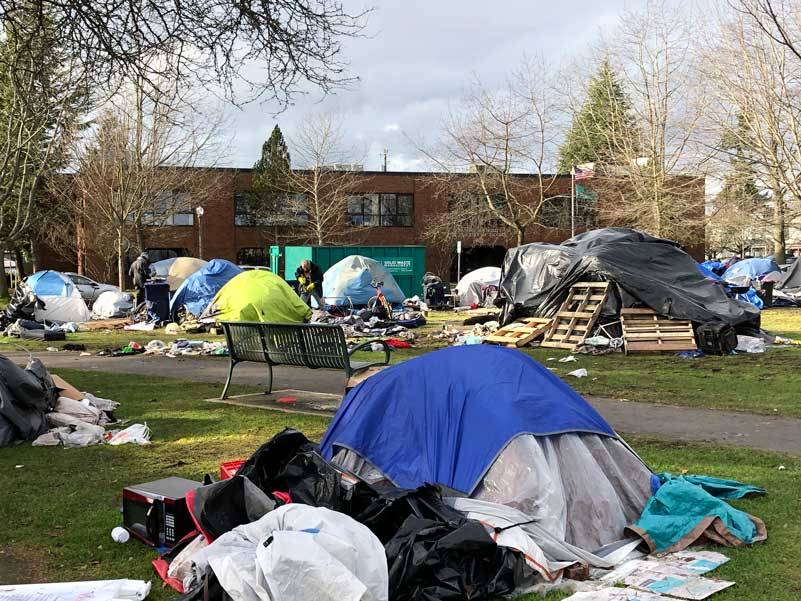By Morf Morford
Tacoma Daily Index
Anyone else bothered by the word “homeless”?
The mess, squalor, hazard, disease and crime potentials of homeless “camps” is an assault on everything from public health to property values and community reputations and much more.
The long term, if not permanent, damage to our infrastructure, to individual career tracks, and to health and development potential is incalculable.
Far too many of us are perfectly comfortable driving, or even walking, past bundled up human beings on our familiar sidewalks and by-passes.
We have become numbed to what, just a few years ago, in any remotely civilized urban setting, would have been intolerable.
I would argue that the extremity – and ubiquity – of homelessness and our evasive cluelessness in response to it emerge quite naturally from our sterile and extruded word for it.
The word “homeless” is relatively new. It essentially did not exist before 1980.
We had people without stable housing before then, of course, but we didn’t have, or need, a term that defined those who were in a transitional state in terms of shelter.
In our downtown areas, especially around rail yards, we could see what we might call “homeless” people. The vast majority were, as in other cities, passing through.
Any “camps” were temporary.
Children and women were exceedingly rare. And if any were seen, the appropriate authorities were almost immediately called on the scene.
The terms I remember for those people were “transients” or “drifters”.
The individuals back then, were, by their own admission, inherently not stable.
A job or relationship could, and usually did, stabilize most of those who, at one time, found themselves “drifting” through town.
And then came the antiseptic, and seemingly objective term “homeless”.
At first it seemed like a word that captured and summed up all of those who were not established in traditional housing.
Most of us use, or hear the word “homeless” as a term that defines, often with a sense of finality, those who find themselves dislocated, often temporarily, and at least as often by circumstances beyond their control from situations as varied as domestic abuse to youthful runaways to landlord disputes to unemployment and much more.
And, as a generation or so ago, these too are temporary disruptions. But we treat them as quasi-permanent.
Our attitudes, policies and yes, our language all presume a near solid permanence to what is, in almost all cases, transitional experiences.
Alternatives to the word “homeless” have emerged, but have not been widely accepted.
“House less” is a term that some people use. It is shelter, after all that is lacking.
The term “homeless” is usually associated with a whole host of other terms from addiction to morally questionable behavior to financial irresponsibility.
Would we use the term “foodless” to describe a hungry person?
Technically it might be accurate, but it tells us nothing about how the person found themselves in such a precarious situation – how they got there or their trajectory or support system that will help them get to a more stable situation.
Would we use a term like “car-less” or “raincoat-less” to describe someone who lacked those things?
Or would we use a term like “income-less” for those who found themselves between stable paying positions?
I don’t think we would.
I think we would see these situations as temporary, and essentially (and quite easily) resolved.
The word “homeless” in contrast, presumes permanence – both in terms of public policy and individual crises – that is inherently unresolvable.
But that homeless camp on our sidewalk was not always there.
That scruffy, bedraggled individual was not always homeless.
We could use an equally accurate, but admittedly clumsier term, like “shelter-less” to describe someone who, because of circumstances beyond their control, find themselves without stable shelter.
Some of us might even remember how awkward the word “homeless” was at first.
But then agencies and the media used it and it became our catch-all term for those who were not established home-owners or renters.
As we all know, we, and every society, have always had a set percentage of those who find themselves in a state of flux when it comes to housing.
College students, young people in general, those dislocated by war, natural catastrophe, fire or relationship crisis have always, and will always, be with us.
What we call them has a lot to do with how we see and respond to them.
Piles of garbage and human waste in urban alleys are to no one’s advantage
We, the housed and unhoused, need to recognize that our state is not inherently permanent.
Different studies of the “homeless” show different results, but two factors consistently emerge; most homeless people came from nearby communities and a solid percentage are employed.
Many are students. Many were home owners and a surprising percentage held professional careers.
A health crisis, a relationship breakdown, an unexpected death or a corporate cut-back could hit almost any of us.
It need not be permanent – unless we make it so.
Our laws and policies need to address the impermanence of the situation we see in front of us.
Being hungry or even unemployed are rarely if ever considered permanent states.
Our laws, attitudes and even vocabulary reflect the impermanence of these conditions.
It’s time to find a word that implies a way out of a difficult situation, an end to harassment and vulnerability and a restoration to productivity and possibility.
Words are literally the labels we assign to people and situations.
We need a new word that sums up the good and the possible for those who have hit a rough patch in their lives.






